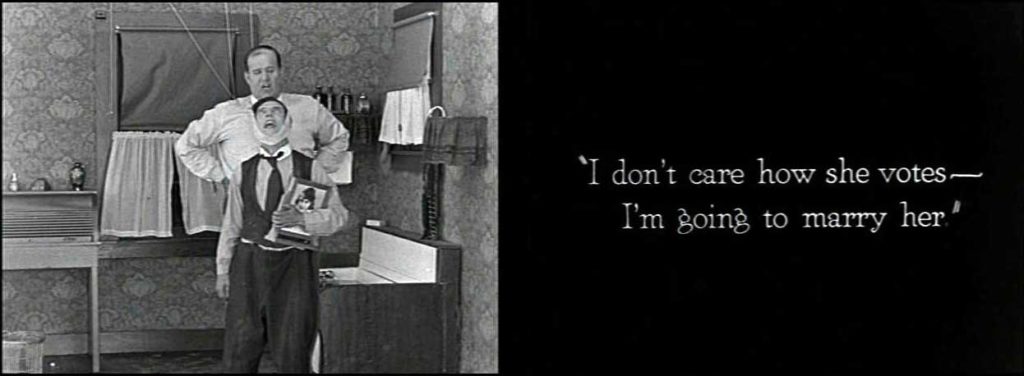I’ve been seeing items posted online over the last few months commemorating the 100th anniversary of the passing by Congress of the 19th Amendment. This reminded me of a joke in a Buster Keaton film. It’s a topical joke, one that I never got and which usually doesn’t a get a laugh.
There is a moment at the beginning of Keaton’s The Scarecrow (1920), after the toothache gag, where Joe Roberts and Buster pick up a photo of their sweetheart off the mantel and being to argue. A dialog title comes on the screen that reads, “I don’t care how she votes – I’m going to marry her.”

During a show, usually this get crickets, or a couple of mild chuckles.
Okay, Buster wouldn’t have put a gag in one of his pictures if it didn’t get a laugh. Nobody would.
So I looked it up.
Well, what else was going on in 1920? Prohibition went into effect that year, and that explains the gag in the second reel with the hip flask in scarecrow Buster’s back pocket. Also the dialog title “My stomach’s as empty as a saloon.”
The Scarecrow was released in December 1920. What was going on in the country in the month or two prior, when the film would have been in production? The 19th amendment was ratified in August 1920 and…1920 was an election year. It was the first time women were voting for a President.
When I introduce this film at a show, I make a point of telling the audience this bit of info, as well as about the ratification of the 18th amendment. I do not tell the audience why I’m giving them this brief history lesson, nor do I divulge the punchline. (Tip: never give away the punchlines of gags in a show intro.) Ever since I’ve started doing this, those two topical jokes get the laughs they deserve.
Topical humor is not something you usually find in a Keaton short, but might have been the sort of thing you’d find in one of the films he’d made over the previous few years with Roscoe Arbuckle. In The Scarecrow, Joe Roberts is practically a stand-in for Roscoe, acting as a friendly rival and not the Eric Campbell adversary he usually is in the shorts.
Roscoe’s dog Luke is Buster’s other co-star in the film, or at least in the first half. Roscoe was almost literally grinding out features for Paramount at this point, light comedy 5-reeler’s helmed by James Cruze. I can’t imagine Roscoe just dropped off his dog at Buster’s set and went fishing.
The first reel of The Scarecrow almost feels like one of the Comique shorts the two had made. I don’t have a time machine to prove anything, but I think that it would interesting to try and line up the shooting dates for the short and whether or not Roscoe was between films.
There’s another post along similar lines of “everything I learned about 1920s culture I learned from silent comedy films” that I wrote about Buster Keaton’s The Cameraman, which you can read here.